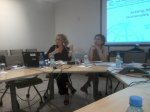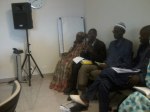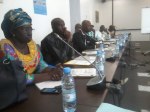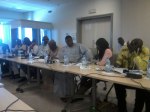Dakar –18th November 2014
“Beyond compensation for land and effective human rights commitments”: Thinking about benefits sharing of WB projects with affected communities!
The World Bank office held a consultation workshop in Dakar (Senegal, West Africa) on the 18th of November. About 80 participants coming from various Senegalese CSOs attended the meeting at the World Bank Regional office in Dakar, among them academics, resettlement experts/consultants, unions, NGOs, communities affected by development projects and a newly established network, namely the “the Civil Society Platform on the WB safeguards”, who organized a preparatory meeting with the support of the Bank on Human Rights Coalition.
The consultation was led by 2 bank staff members, among them Nina Chee, World Bank acting safeguards coordinator, coming from Washington and Nathalie Muntzberg, Legal Officer at the WB Dakar office.

Leads of the consultation: Nina Chee, WB acting safeguards coordinator (Washington) and Nathalie Muntzberg, WB Dakar office (R to L)
A day before, 21 CSOs from various sectors such as Human Rights, Environmental and Union organizations met at the Open Society West Africa office to strategize in preparation of this consultation. The Platform agreed at the end of the meeting to build their actions on 6 key issues to be run by some volunteers during the consultation. First of all, the group agreed to participate as a single body in order to be identified in the room as a well-organized group. In addition, the group selected 6 volunteers to speak on behalf in a balanced way.
The following 6 issues were identified for comments:
- Consultation process and general comments on the draft;
- Union’s comments on labor standards;
- HR NGOs on the HR language at the World Bank;
- Land and resettlement;
- Rights of persons with disabilities;
- Testimonies and declaration of people affected by the coal power plant project of the AFDB with the perspective of demanding strong safeguards to protect vulnerable peoples, to allow benefit sharing of projects funded by MDBs, and to avoid displacement and impoverishment of communities;
The consultation itself:
About 25 participants took the floor during the meeting. Our strategy was very relevant to help raise the bar of debates which focused mainly on:
Land, resettlement and compensation:
80% of the discussions were about land, consultation of affected people and compensation. Participants and bank staff recognized both the complexity of the issue and the need to strengthen the WB policy in order to provide more protection of local communities from impoverishment. So one key recommendation is to ‘’ go beyond compensation and look out about benefits sharing of bank’s projects”
The statement read by representatives (and testimonies of fisher women who have lost their means of subsistence) of Bargny’s communities affected by the Sendou coal power plant funded by the AFDB heated the room during the discussions.
Labor:
While speakers appreciated the new framework on labor, unions have pointed out the lack of effective language on decent wages, ILO conventions, discrimination, the scope, and supply chain.
In response, the bank agreed on the critiques and said that they are in touch with the ILO for possible improvement of the labor provisions.
Human rights:
Human Rights NGOs raised questions about human rights language in the draft policy, as the bank is a UN organization and the Guiding Principles on BHR recommend clear commitment on HR at high level corporate. Further, as states are obliged to respect and promote HR, the bank which belongs to the states should do this.
But the bank staff argued that the mission statement of the WB doesn’t allow it to use such language (politics) in its operations or lending programs. Furthermore, they said that they cannot mention all international convention in the safeguards or choose a few of thousands of them while being silent on others.
The consultation process and general comments:

Representatives of communities affected by the coal power plant project in Bargny (in the middle, the GS of Rencontre Africaine des Droits de l’Homme/Raddho)
One participant from Bank on Human Rights Coalition (‘’Lumiere Synergie pour le Developpement’’/LSD) who mobilized Senegalese CSOs raised concerns about the lack of transparency, discrimination and weak consultation process. The time given to prepare the meeting was not enough (less than 3 weeks), there is only one consultation in the West African region, they did not provide any travel support for CSOs living outside of Dakar, many CSOs who requested an invitation didn’t get one (LSD committed itself to bring them all into the bank), etc.
On the general comments, LSD recalled to the bank the letter (with comments) sent to the bank on the 8th October and the protest of CSOs in Washington during the WB/IMF annual meetings.
And finally LSD/BHRC representative urged the bank to:
- Build on lessons learned from the ground, and Senegal has great experience in that sense:” the bank was a leader in adopting strong safeguards in the past 20 years, even the AFDB was inspired by WB’s policy when drafting its one Integrate Safeguards System (ISS) in 2012. So, we ask the bank to keep and demonstrate its leadership by adopting a strong policy that helps protect vulnerable people and the environment”;
- Share the consultation report with all participants before approval of it by the bank.
The bank denied all these complaints, saying that their doors are open, and everyone is welcomes at meetings, they will organize a meeting in Cameroon, etc.
Use of country systems:
CSOs also raised the point on the use of country systems which seems that the bank is transferring its responsibility to borrowers. But CSO stressed that the bank should provide more details on the how, because some our national systems are weak like the one on resettlement and compensation.
The bank staff responded that this is just an option but the safeguards should be mandatory for all borrowers. And of course this section could be improved in the next draft.
Indigenous peoples:
While admitting that FPIC introduction in the policy is good, CSOs pointed out the issue of IP definition, because of some similitude between IP and ‘’bassari” people in the East of Senegal who are not recognized as such.
For the bank staff, introduction of FPIC is a big step in the policy improvement of the bank. On the other hand, they said that only a small proportion of the WB projects are implemented within IP regions.
In terms of lessons learned from that consultation, the fact that participants came with concrete examples and testimonies from the ground (Diamniadio Highway project/WB project, International Airport AIDB/ WB project, OMVS/ WB project, Sendou Coal power plant/ AFDB project) helped to provide evidence and show to the bank the failure of its policy to protect the people and the environment.
However, climate change, stakeholder engagement and biodiversity occupied little room on the whole discussions.
Finally, due to the high interest of participants on land and resettlement, Bank local staff Mademba Ndiaye (communication officer) proposed at the end of the day to consider holding an expert meeting on resettlement and land in the future in order to provide more valuable comments and inputs on the draft.
The commitment of participants and the high quality of the discussions extended the time frame which went 2 hours beyond the allocated time of the consultation.




